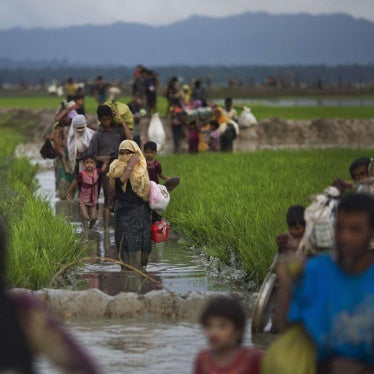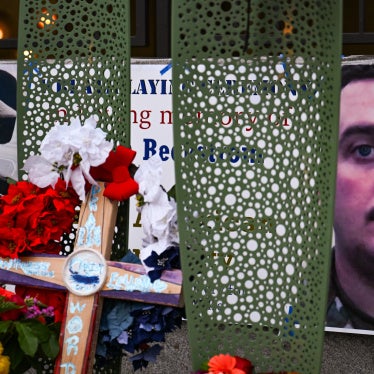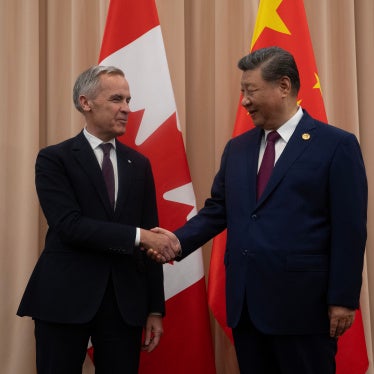BANGKOK — It has been two years since the enforced disappearance of Sombath Somphone, a renowned civil society leader in Laos and 2005 Magsaysay Award winner. He vanished at a police checkpoint in Vientiane on December 15, 2012. Despite the efforts of his wife, human rights monitors, and his many friends in the international community, the Lao government has yet to offer a credible explanation of Sombath’s whereabouts.
Video footage of when Sombath was last seen is damning. A security camera recorded police stopping Sombath’s jeep on a main thoroughfare in Vientiane and unidentified men taking him into the Thadeua police post. The footage clearly places Sombath at the checkpoint, and shows him shortly thereafter being led to another vehicle and driven away. He has not been seen or heard from since.
From a modest rural background, Sombath dedicated his life and talents to helping rural farming communities through innovative techniques, support of handicraft production, and training and capacity building for youth and community leaders. In a poor, primarily rural country such as Laos, the government should be commending activists like Sombath for his leading role in promoting sustainable development initiatives. Instead, it has obstructed any investigation into his disappearance and has rebuffed international efforts to find answers.
Under the oppressive one-party rule of the Lao People’s Revolutionary Party, even development work was apparently too much.
It is suspected that Sombath’s dedication to supporting and empowering communities and civil society may have led to his abduction. In Laos, the space for a vocal civil society is withering fast. In fact, the government has been amending legislation and decrees to further strengthen its grip over the operations and activities of both local nonprofit associations and international nongovernmental organizations involved in development work.
The Lao government is planning to tighten permissible areas of work by nongovernmental organizations as well as require burdensome permissions for local nonprofits to receive foreign funds.
Lao authorities have continually denied any involvement in Sombath’s disappearance. To the stream of top diplomats and foreign officials that have raised Sombath’s case with them, it has spun incredible theories of possible Thai mafia involvement and other absurdities. However, there is little evidence to suggest that an investigation is actually ongoing since the government released the last update on the progress of the investigation more than a year ago, and there has been no effort to keep Sombath’s wife, Shui-Meng Ng, apprised of the status of the investigation.
Next month, Laos will appear before the UN’s Human Rights Council for its second Universal Periodic Review. This stands as an important opportunity for member states to push Laos to make tangible changes toward improving its rights record and demand accountability in Sombath’s case.
Enforced disappearance is forbidden under international law. Under international human rights treaties ratified by Laos, the government has an obligation to conduct a transparent, thorough, and impartial investigation of the case.
Laos has clearly failed to fulfill these obligations, while at the same time repeatedly refusing offers by various governments from the EU, as well as Canada and the US, to provide technical assistance to aid the investigation.
The government has demonstrated no real interest in resolving the case or uncovering who is responsible. And so the question remains, why exactly are the authorities making such a concerted effort to cover up the story behind his enforced disappearance?
ASEAN countries, too, have been regrettably silent about his abduction. In marking the second anniversary of his disappearance, Human Rights Watch and more than 80 groups in Asia and around the world signed a joint statement urging ASEAN to push for accountability and justice in the Sombath case. ASEAN should take their advice, uphold its expressed commitment to human rights, and pressure the Lao authorities to disclose Sombath’s whereabouts.
Sombath is one of 10 individuals detained by Lao authorities under circumstances suggesting government involvement. The whereabouts of the nine others remain unknown. The Sombath case is emblematic of how the Laos government believes it can commit abuses with almost absolute impunity.
This month, Sombath’s wife, Ng Sui Meng, announced the Sombath Initiative at a news conference in Bangkok. This campaign, involving many of Sombath’s many friends around the world, will push the Lao government for answers. Sui Meng said she will “not give up asking and looking for and requesting the Lao government, officials, and police to please give our family sympathy and give us answers soon.”
The wall of official Lao silence cannot succeed, especially with the global spotlight of the Universal Periodic Review process on the horizon at the UN.
It is time for all governments to stand in solidarity with Sombath Somphone and demand an immediate end to his disappearance.
Shaivalini Parmar is a senior associate in the Asia division of Human Rights Watch. Follow her on Twitter @ShaivaliniP








